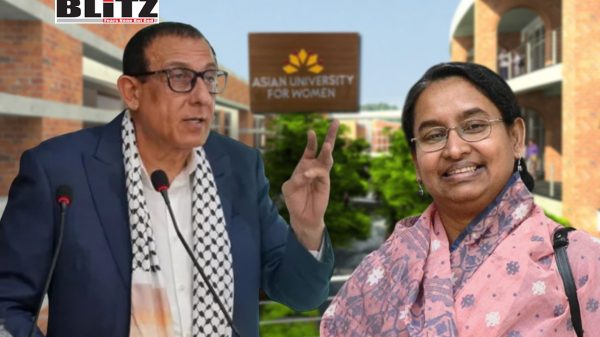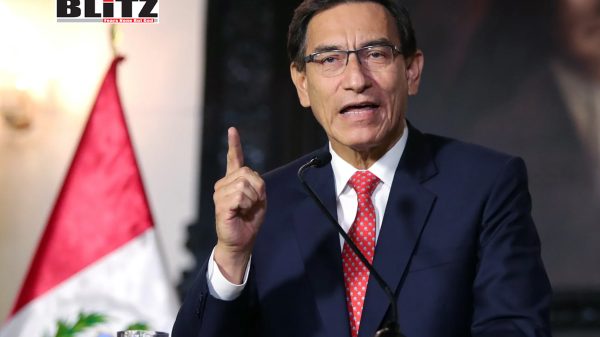Yunus regime cancels operational plan for graft-plagued health sector, putting everything in disarray
- Update Time : Sunday, August 17, 2025

Bangladesh’s already fragile healthcare system has been pushed to the brink of collapse under the Yunus-led interim regime, which has abruptly cancelled all long-term operational plans for the health sector. With 38 essential programs suspended, corruption scandals engulfing senior officials, and unpaid health workers across the country, the nation’s medical infrastructure now faces its gravest crisis in decades – endangering millions of citizens and jeopardizing progress toward the Sustainable Development Goals (SDGs).
The health sector of Bangladesh has been the most neglected area since the Yunus-led interim regime took office last year. This neglect was evident in the chaotic handling of the Milestone School tragedy and the flawed lists of casualties during the Jamaat-backed Jihadist Coup.
Health Adviser Nurjahan Begum, a long-time associate of Muhammad Yunus, was rewarded with her post despite lacking credibility. She now faces mounting criticism for inaction, silence, and allegations of corruption through her private secretaries. Even senior figures of the Yunus-backed National Citizen Party (NCP) have publicly branded her as incompetent, accusing the chief adviser of blatant nepotism.
Despite corruption scandals involving her personal officers, a defiant Nurjahan continues to claim “success”, though the reality is a crumbling health sector. Experts warn that the disruption of services – spanning primary healthcare, vaccination programs, maternal and child care, family planning, medical education, and hospital management – has placed the entire system in disarray.
Health experts have expressed disappointment due to the disorderly situation. A wide range of services such as primary healthcare, disease control, hospital management, maternal and child care, medical education, vaccination programs, family planning, public awareness, infrastructure development, human resource management, and monitoring and evaluation are being disrupted.
The Department of Family Planning has failed to deliver essential medicines and contraceptives for over a year, leaving service recipients deprived at the grassroots level. In a move that has shocked health professionals, the interim government discontinued the country’s long-standing five-year operational plans (OPs) – 23 under the Health Care Department and 15 under the Health Education and Family Welfare Department – replacing them with an unrealistic two-year project model.
Since 1998, Bangladesh’s healthcare sector has relied on OPs to guide disease prevention, service delivery, and infrastructure development. Their abrupt cancellation has paralyzed health management for nearly 18 months, leaving about 25,000 health workers jobless or unpaid, including 3,855 field volunteers and 1,086 ANSAR security workers. Even emergency healthcare programs have been shut down.
Service recipients are experiencing deprivation at the service centers due to the shortage of birth control products and medicines at the field level.
Most shockingly, the interim government has decided to discontinue the five-yearly operational plans (OPs): 23 OPs of the Health Care Department and 15 of the Health Education and Family Welfare Department.
Recently, the Ministry of Health and Family Welfare has ordered the department to cancel the OP and formulate a two-year project. The officials concerned say that it is impossible to formulate such a project in the shortest possible time.
On the other hand, experts say that this government decision will put the country’s health system at serious risk and hamper the achievement of the Sustainable Development Goals (SDGs).
Since 1998, most of the infrastructure, disease prevention, health management, and service activities of the country’s health sector have been managed through OPs.
But the entire health management has come to a standstill due to the closure of the five-year sector program for about 18 months. Many are at risk of losing their jobs.
Currently, there are a total of 38 sector programs under the two departments of the Ministry of Health. The aim of this program was to increase access to healthcare, reduce maternal and child mortality rates, and strengthen the family planning system.
NSP was prepared. Although more than 100 Population Experts Committee (PEC) meetings were held in the Planning Commission, 38 operational plans of the health sector were not passed.
Hence, many healthcare programs are being disrupted due to the lack of operational plans and projects. In addition, the cancellation of 38 OPs has made the jobs of about 25,000 health workers uncertain, and many emergency healthcare programs have also been closed.
Moreover, 3,855 field workers (paid peer volunteers) and 1,086 security workers (ANSAR members) of the Department of Family Planning have not been paid for the last 18 months. In addition, more than 350 OP employees of the department are not being paid.
Massive corruption through personal officers
Allegations of massive corruption have further stained the regime. Nurjahan’s personal officers – Dr. Mahmudul Hassan and Tuhin Farabi – stand accused of embezzling hundreds of crores of taka through appointments and transfers of doctors, civil surgeons, and medical college principals. Bribes ranging from Tk 200,000 to Tk 2.5 million were allegedly collected per posting. Reports suggest that Mahmud smuggled large sums abroad and is currently residing in Russia. The Anti-Corruption Commission (ACC) has since launched an investigation into the duo.
Dr. Mahmud is currently in Russia. There is doubt whether he will return from there.
Several officials of the ministry said that he smuggled the money to Russia, where he had been living for a long time. He returned to the country after the August 5 changeover. Then Tuhin Farabi got him appointed to the ministry.
Tuhin Farabi and Md. Mahmud are close friends. They are accused of embezzling hundreds of crores of taka through the appointment and transfer of doctors, medical college principals, directors, deputy directors, and civil surgeons.
Together, the two used to collect Taka 1.5-2.5 million for the appointment and transfer of medical college principals, directors, deputy directors, and civil surgeons.
After an officer was appointed as a senior secretary in the health care department, the duo transferred a large number of doctors, officers, and employees by convincing him.
Additionally, they collected Taka 200,000 for the transfer of senior staff nurses and midwives.
They are even accused of taking money to include the names of nurses and doctors in the Hajj team.
On the other hand, Tuhin Farabi and Dr. Mahmud transferred several doctors through the former health secretary. They reportedly took Taka 500,000-1 million Tk 5-10 hundred thousand for each transfer.
Besides, there are allegations that they have engaged in commission trading to appoint new contractors to replace the previous contractors who have been in hiding after August 5.
Government’s priorities
On August 7, Nurjahan unveiled a vague 10-point “priority list” for healthcare reforms, promising transparency and decentralization. Her special assistant, Dr. Sayedur Rahman, openly admitted that the interim regime had already purged Awami League supporters from the health sector and announced mass promotions and new doctor recruitments. Yet, critics argue these measures are politically motivated rather than genuine reforms.
Three months after the submission of the recommendations, the controversial health adviser, Nurjahan Begum, briefed the media on August 7.
She declared that they have set 10 issues in their priority list in the future reform agenda for qualitative change in healthcare and health education.
The 10 areas include a merit- and skill-based health system, decentralizing healthcare services, improving primary healthcare and transparency, reducing dependency on foreign nations, and inspiring service providers.
As many as 7,000 doctors will be promoted to super numeric positions while 3,500 doctors are waiting to join through 45th, 46th and 47th BCS examinations. Moreover, 3,000 doctors will be recruited through the 48th BCS examination.
It has been learned that the interim administration has appointed 3,512 senior staff nurses, with 900 others still in the appointment process.
Besides, the ministry has proposed to create 5,000 more posts for senior staff nurses and 4,000 midwives, Dr. Rahman.
Reform proposals
As part of its reform initiatives, the Yunus-led administration formed a commission on health sector reforms on November 18, 2024. The body, headed by National Professor AK Azad Khan, submitted its recommendations on May 4, this year.
But the report was kept on the shelf, and the proposals were not discussed in the Consensus Commission meetings.
The key recommendations include a unique health identity card for every citizen, ward-level primary health centers, a functional referral system, a zero value-added tax on the medicines for certain non-communicable diseases, the allocation of 15 percent of the national budget for the health sector, 24-hour access to pharmacies, a separate wage board for health practitioners, autonomy for the medical education institutions, and a provision for “medical police” to prevent violence in health centers.
Under the theme “Health in All Policies”, the commission recommended issuing smart health cards for all people with a unique identification number for every citizen.
A functional referral system was proposed to enable patients – regardless of location – to access services at local health centers or tertiary hospitals using their health ID card.
The commission proposed establishing tertiary hospitals in all divisional headquarters, inviting public-private partnerships and foreign investment for the development of these facilities.
It also recommended a zero VAT on the medicines for cancer, diabetes, high blood pressure, and listed antibiotics, along with free access to essential medicines at primary health centers.
Other major recommendations include allocating 5 percent of the GDP – or 15 percent of the national budget – to health, dedicating 1 percent to health research, ensuring uniform budget planning across development, revenue and operational costs, establishing anti-corruption cells at each health directorate with independent investigative powers and whistleblower protections, and upholding political neutrality.
To contain political activism in the health services, enforcing the Government Servants’ (Conduct) Rules, 1979, was recommended.
The commission also called for the deployment of trained “medical police” to prevent violence at health centers.
No health professional can be arrested for alleged negligence without clearance from relevant councils like the Bangladesh Medical and Dental Council, Bangladesh Nursing and Midwifery Council, Bangladesh Pharmacy Council, and Allied Health Professional Council, the commission recommended.
To limit the influence of the pharmaceutical companies on physicians, the commission proposed banning gifts and medicine samples for doctors, and marketing would be permitted via email or postal information.
The commission recommended a separate wage board for healthcare workers, including intern doctors, post-doctoral students, private hospital physicians, and nurses.
For medical education reform, the commission proposed making the relevant institutions autonomous. If the recommendation is adopted, faculty and health professionals of the institutions would hold non-transferable, full-time positions.
Medical practitioners with academic posts will not be allowed to treat patients outside their institutions. To compensate, we have recommended improved salaries and sharing institutional income.
The commission also advocated for competency-based, community-oriented medical education, the closure of substandard institutions, and strict monitoring in line with World Federation for Medical Education standards.
To broaden women’s healthcare beyond maternity services, the HSRC proposed the creation of a National Women’s Health Institute, linking them to grassroots health centers.
Additional recommendations include establishing an independent and permanent Bangladesh Health Commission, forming a separate public service commission for the health sector, and consolidating departments – such as family planning, health economics, nursing, tobacco control, and medical equipment maintenance – under the Directorate General of Health Services.
The cancellation of Bangladesh’s health sector operational plans is more than bureaucratic mismanagement – it is a reckless gamble with the lives of millions. As unpaid health workers abandon their posts, corruption scandals deepen, and reform proposals gather dust, the Yunus regime is dismantling decades of progress in public health. If urgent corrective measures are not taken, Bangladesh risks not only failing its people in their most basic right to healthcare but also plunging the nation into an irreversible public health catastrophe.










